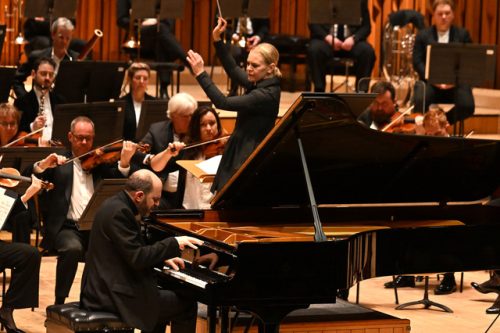
[ad_1]
 United Kingdom Debussy, Ravel, Scriabin: Kirill Gerstein (piano), Sopranos and Altos of the London Symphony Refrain, London Symphony Orchestra / Susanna Mälkki (conductor). Barbican Corridor, London, 3.12.2023. (KMcD)
United Kingdom Debussy, Ravel, Scriabin: Kirill Gerstein (piano), Sopranos and Altos of the London Symphony Refrain, London Symphony Orchestra / Susanna Mälkki (conductor). Barbican Corridor, London, 3.12.2023. (KMcD)

Debussy – Three Nocturnes
Ravel – Piano Concerto for the Left Hand
Scriabin – Symphony No.4, The Poem of Ecstasy
Acclaimed Finnish conductor, Susanna Mälkki, was on the town to conduct a pair of concert events with the LSO – this being the second the place she was joined by Russian-born pianist, Kirill Gerstein, who additionally occurs to be this season’s Highlight Artist. The selection of repertoire for this well-attended night of music-making was completely judged, bringing collectively seminal works by Debussy, Ravel and Scriabin.
The epithet ‘impressionism’ is inevitably wheeled out when discussing Debussy’s output, but it appeared completely apt in these circumstances as Mälkki led a ravishing account of his Three Nocturnes. Orchestral colors shimmered languidly within the opening ‘Nuages’ – Mälkki bringing out particular person particulars that one had not heard earlier than, with all sections of the orchestra attentive to each nuance of this kaleidoscopic rating.
It is a work of contrasting moods, which Mälkki was at pains to emphasize, no extra so than within the effervescent nature of ‘Fêtes’, the place she coaxed, wealthy, iridescent enjoying, notably from the trumpets and harps, completely catching the motion’s dance-like qualities. ‘Sirènes’ concludes the work, the place Debussy introduces a wordless refrain, made up solely of sopranos and altos, which is designed to evoke the ocean and the mysterious music of the sirens ‘as they giggle and go on’. Once more, Mälkki captured the ebb and stream to perfection, and the refrain, expertly coached by refrain director Mariana Rosas, was at turns eerie and seductive.

Ravel’s Piano Concerto for the Left Hand was commissioned by Paul Wittgenstien, who misplaced his proper arm preventing within the Austrian military within the early months of World Struggle I. It’s a work that’s fiendishly troublesome from a technical perspective, and one the place the soloist is required to shift by a gamut of feelings inside a comparatively brief area of time – the work lasts 18 minutes and is written in a single motion. Gerstein’s enjoying was massively spectacular, as his razor-sharp approach by no means faltered, and he was in a position to adapt to the shifting strikes with ease. There was a way of pleasure and abandonment in the way in which he approached this difficult half, bringing a filigree lightness to the unaccompanied passages, while not shying away from a extra assertive assault when pitted in opposition to the orchestra. Mälkki ensured good stability between the 2 – in a piece so richly scored there’s all the time the hazard that the orchestra will overwhelm the soloist, however not right here.
For an encore, Gerstein was joined by concertmaster Roman Simovic within the second motion of Ravel’s Violin Sonata. They each threw themselves into the piece, which is suffused with the Blues, and caught the essence of the work to a tee.
After the interval we had been handled to an explosive efficiency of Scriabin’s Symphony No.4, The Poem of Ecstasy. Though this can be a 25-minute, single-movement work, it’s scored for a big orchestra – a minimum of 21 brass gamers, 6 percussionists, and an organ thrown in for good measure – so requires a conductor who can marshal these massive forces, hold the orchestral strains lucid, and mildew the work organically, whereas maintaining a tally of the amount. Mälkki managed all three – permitting solos strains to come back to the fore and maintaining the textures crystal clear – which is not any imply feat in a piece that may simply descend into bombast. This was as viscerally thrilling a efficiency of this unusual, enigmatic piece that we’ve heard within the live performance corridor. Each part of the orchestra performed out of their skins for her, and whereas it might appear invidious to single out anybody from such a convincing staff effort, James Fountain’s exemplary trumpet enjoying was the stuff of legend. Scriabin allocates the primary rising and falling theme of the work to the trumpet, which seems usually, and is notoriously troublesome to play, but Fountain rose to the problem every time.
Mälkki wasn’t afraid to shrink back from permitting the orchestra its head within the closing bars, bringing the work to its exhilarating and shattering climax. Pitch-perfect enjoying, from an orchestra on the very high of its recreation, underneath a conductor who positively brings out the very best in them – this was a superb night of music-making.
Keith McDonnell
[ad_2]